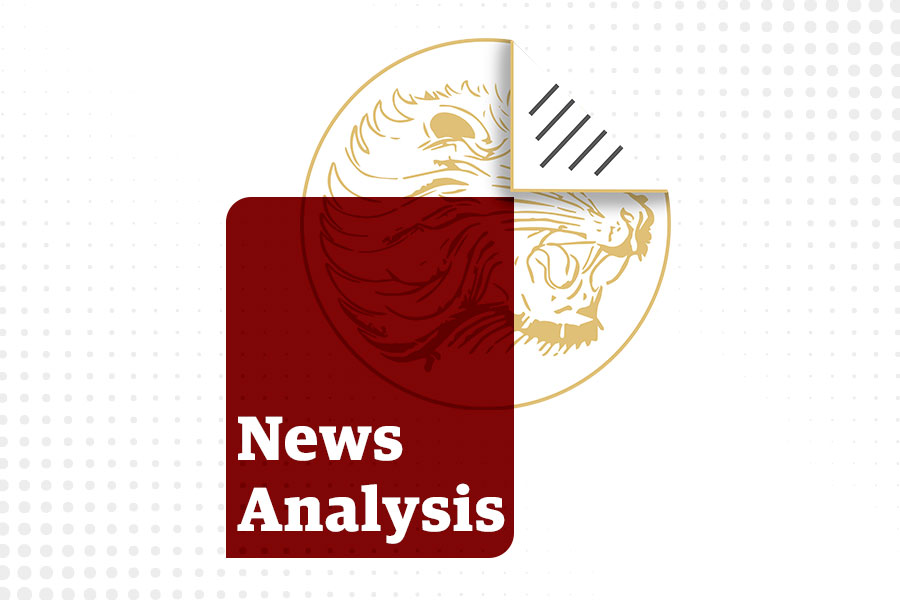
Fortune News | Jun 11,2022
Jun 11 , 2022
By Christian Tesfaye
If there is a government unprepared for decentralised digital currencies, it should be that of Ethiopia’s. There is neither a stock market, sophisticated financial products, foreign banks, nor a secondary bond market. To skip all of this and face the challenge of Bitcoin and Dogecoin is like coachmen piloting a plane.
On the other hand, Ethiopia’s economy is primed for decentralised digital currencies or at least their promise. Part of the challenge the likes of Bitcoin were hoped to solve is to serve as a hedge against currencies such as Birr that are volatile and weakening, and provide an alternative to hard currencies in parts of the world that have poor access to it. The black market exists to offer a decentralised and anonymous market for transactions free of government oversight, filling the gap of market failures. Bitcoin is a natural ally to Ethiopia’s mushrooming and self-inflicted black market operations.
No wonder then that the National Bank of Ethiopia (NBE) is worried. It released a press statement that emphasised transactions in any currency outside of the Birr are prohibited. It alleged that cryptocurrencies are growing, especially in money laundering. The fact that the central bank felt that it needed to make its standing on digital currencies clear is striking.
Morbidly, it is engrossing that Bitcoin has become the money laundering weapon of choice for a few (or many). It seems very dangerous to the criminals themselves. To begin with, since there are no formal crypto exchanges in Ethiopia, the likes of Bitcoin are likely being acquired from someone that already bought them in a foreign currency. For this third party to sell Bitcoin in Ethiopia, they will have to price in the risk of Birr’s depreciation and the challenge of expatriating any profit out of Ethiopia. As a result, anyone buying a cryptocurrency here is doing so at a much higher premium than in most other countries.
But this only raises the problem of the Birr’s risk. It says nothing of the volatility of decentralised digital currency. A single bitcoin was selling at over three million Birr at its peak last year, at 2.3 million Br on March 1, 2022, and has recently been trading at a low of 1.5 million Br. By standing its ground on cryptocurrencies, the central bank saves these money launderers a lot of money. It is a big enough headache dealing with exchange rates of the Birr for multinationals. It is hard to imagine dealing with Birr-Bitcoin exchanges and coming out a winner.
Of course, cryptocurrencies offer one advantage. Laundering money into assets or foreign currency still leaves something tangible that could be traced back. When it comes to decentralised digital assets, whether 10 million Br or 100 million Br, it is a bunch of code that could be hidden away in a folder on a computer or a phone. It is not untraceable but tough to trace. Even then, the combined volatility of the Birr and cryptocurrencies makes them highly questionable alternatives.
There could be a silver lining to all of this. It gets us talking about the role that could be played by digital currencies, crypto and blockchain. They cannot be shut out from Ethiopia, whether or not the central bank likes it.
It is natural for central banks to be sceptical of crypto. If they succeed in what their enthusiastic supporters believe the likes of Bitcoin can do, they are a threat; if they fail, they are also a threat.
Success means cryptocurrencies replacing fiat money. The widespread adoption of a truly decentralised currency will make central banks irrelevant as they will be unable to conduct monetary policy. A currency completely ruled by market forces could wreak havoc on the global economy because governments will be unable to do much in the face of market failures. In the case of Africa, since much of the cryptocurrency is being held in the Global North, widespread adoption could mean the type of inequality fiat currencies never managed to create.
The failure of cryptocurrencies as legitimate money will also have its own consequences. In fact, this is what is happening now. Since the likes of Bitcoin have not managed to serve as money – for transaction purposes or as a unit of account – they are being used for speculation. Bitcoin has no intrinsic value. Anyone who buys it is hoping that someone else will buy at a higher price, and on and on it goes – a classic bubble. The bigger this bubble gets, the more likely it threatens financial markets and even the economy.
Bitcoin and Dogecoin will likely not replace fiat money. But blockchain and crypto are not entirely useless either. Smart people in the early development of the internet did not precisely know what it would become, and the many talented people in the so-called Web3 space do not know how blockchain will contribute to the economy and human wellbeing. But it does not mean that something revolutionary will not come out of it. Ethiopia should not go the way of El Salvador or the Central African Republic in legalising Bitcoin, but it is crucial we discuss, debate, stay informed and keep an open mind.
PUBLISHED ON
Jun 11,2022 [ VOL
23 , NO
1154]


Fortune News | Jun 11,2022

News Analysis | Mar 09,2024

Fortune News | Nov 02,2019

Covid-19 | Mar 28,2020

Editorial | Jun 07,2025

Sunday with Eden | Feb 19,2022

Radar | May 20,2023

Radar | Jan 12,2019

Radar | May 18,2024

Fortune News | Sep 10,2023

My Opinion | 131974 Views | Aug 14,2021

My Opinion | 128363 Views | Aug 21,2021

My Opinion | 126301 Views | Sep 10,2021

My Opinion | 123917 Views | Aug 07,2021

Dec 22 , 2024 . By TIZITA SHEWAFERAW
Charged with transforming colossal state-owned enterprises into modern and competitiv...

Aug 18 , 2024 . By AKSAH ITALO
Although predictable Yonas Zerihun's job in the ride-hailing service is not immune to...

Jul 28 , 2024 . By TIZITA SHEWAFERAW
Unhabitual, perhaps too many, Samuel Gebreyohannes, 38, used to occasionally enjoy a couple of beers at breakfast. However, he recently swit...

Jul 13 , 2024 . By AKSAH ITALO
Investors who rely on tractors, trucks, and field vehicles for commuting, transporting commodities, and f...

Jul 5 , 2025
Six years ago, Ethiopia was the darling of international liberal commentators. A year...

Jun 28 , 2025
Meseret Damtie, the assertive auditor general, has never been shy about naming names...

Jun 21 , 2025
A well-worn adage says, “Budget is not destiny, but it is direction.” Examining t...

Jun 14 , 2025
Yet again, the Horn of Africa is bracing for trouble. A region already frayed by wars...

Jul 6 , 2025 . By BEZAWIT HULUAGER
The federal legislature gave Prime Minister Abiy Ahmed (PhD) what he wanted: a 1.9 tr...

Jul 6 , 2025 . By YITBAREK GETACHEW
In a city rising skyward at breakneck speed, a reckoning has arrived. Authorities in...

Jul 6 , 2025 . By NAHOM AYELE
A landmark directive from the Ministry of Finance signals a paradigm shift in the cou...

Jul 6 , 2025 . By NAHOM AYELE
Awash Bank has announced plans to establish a dedicated investment banking subsidiary...